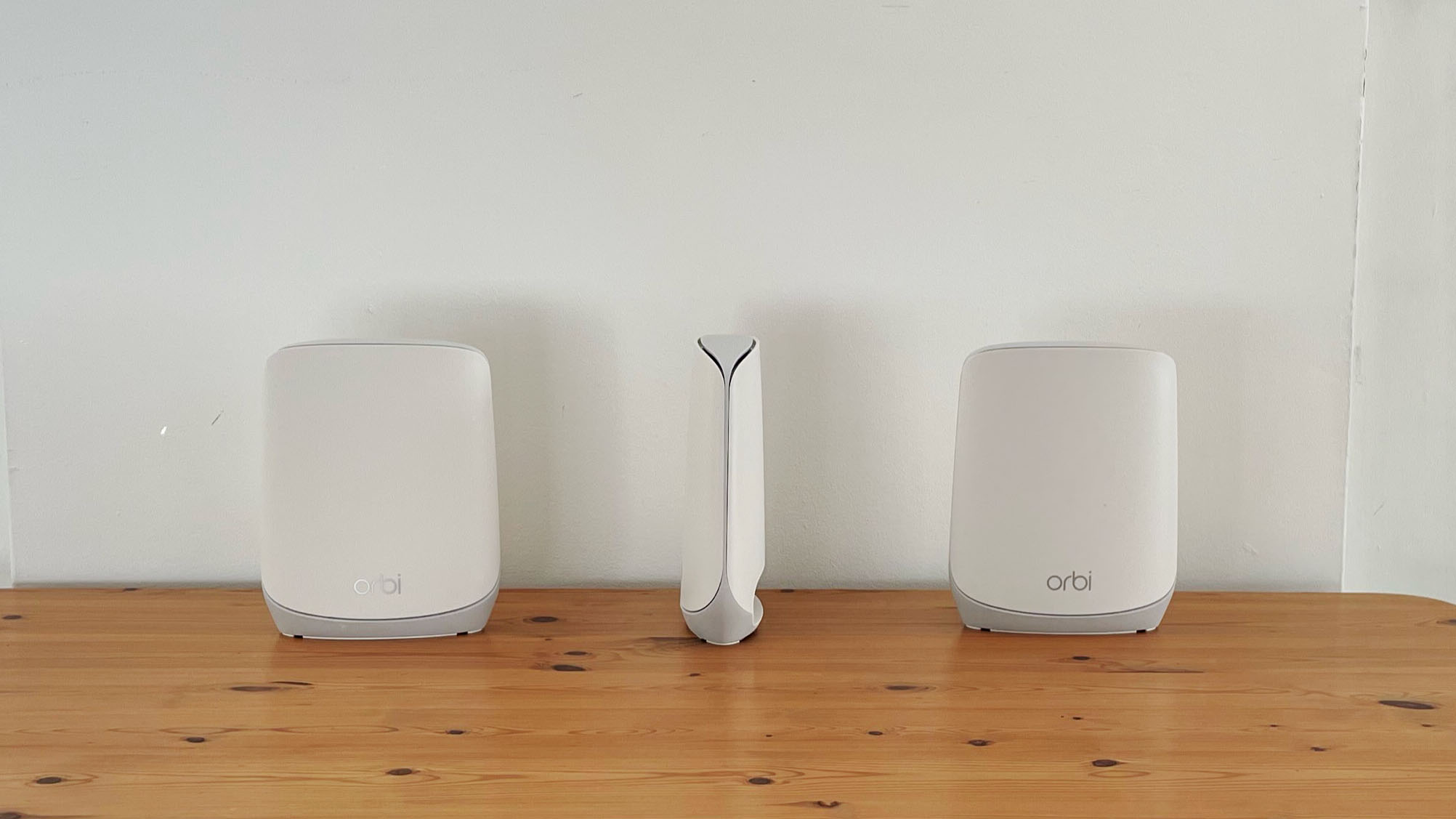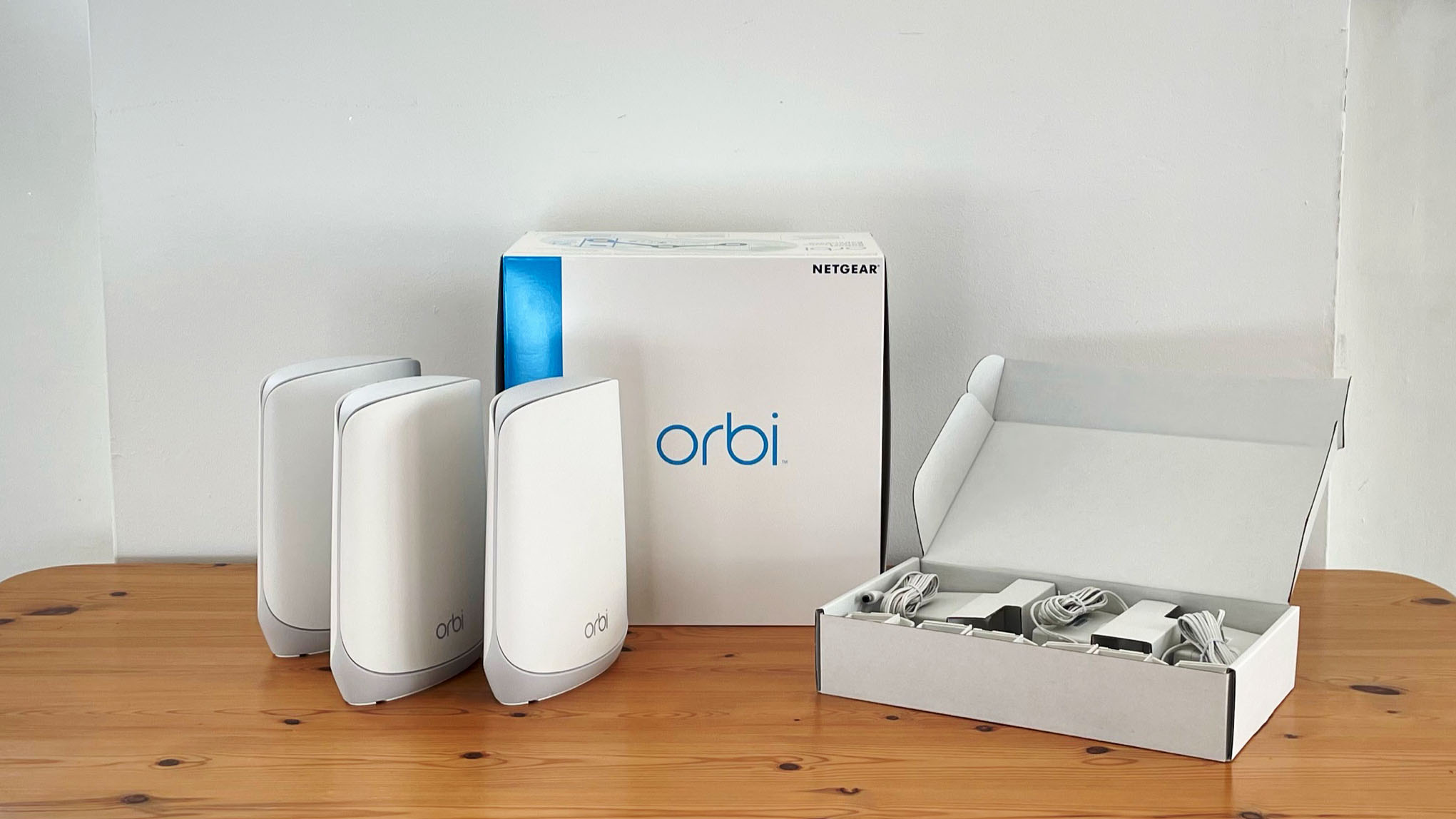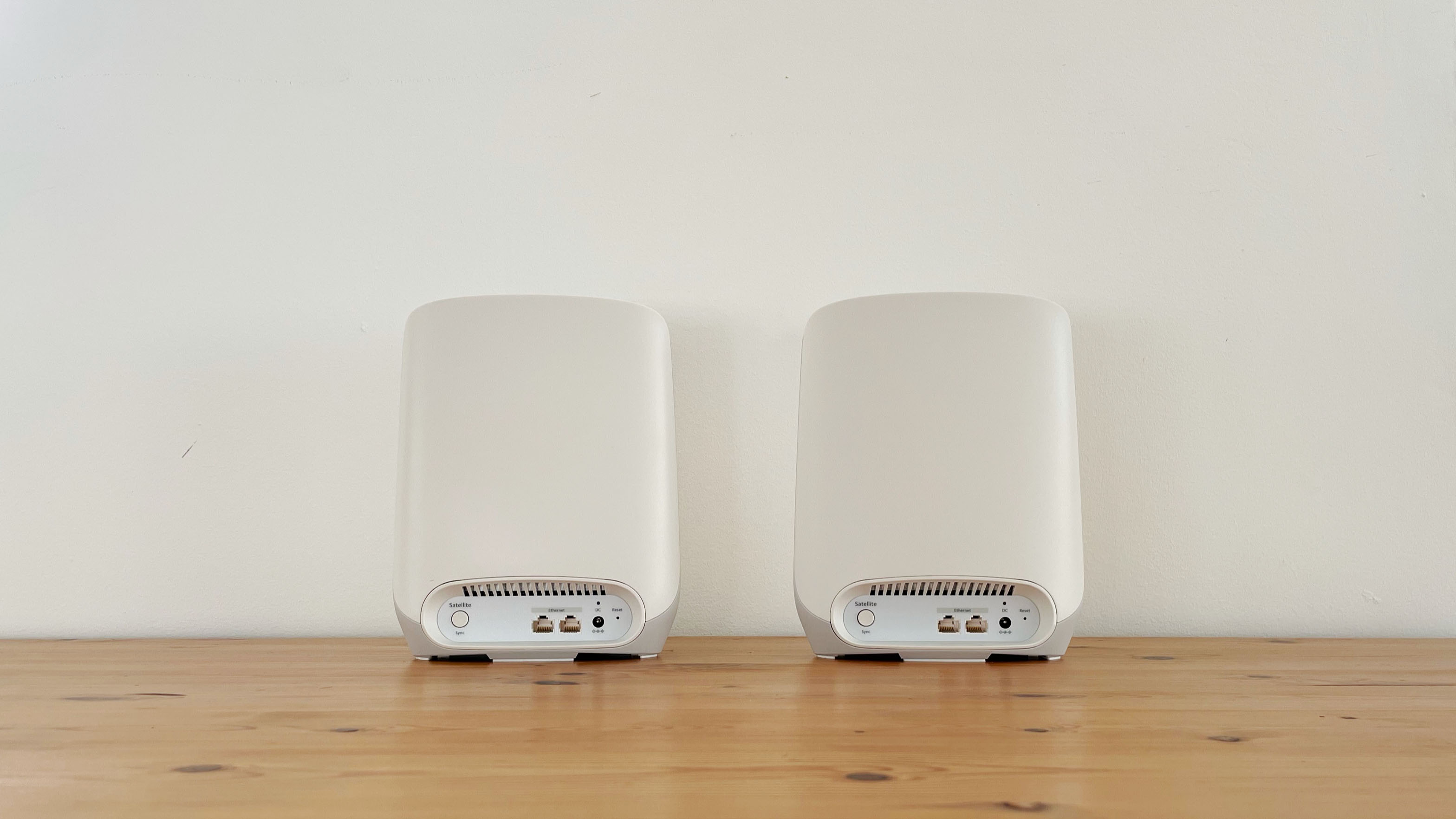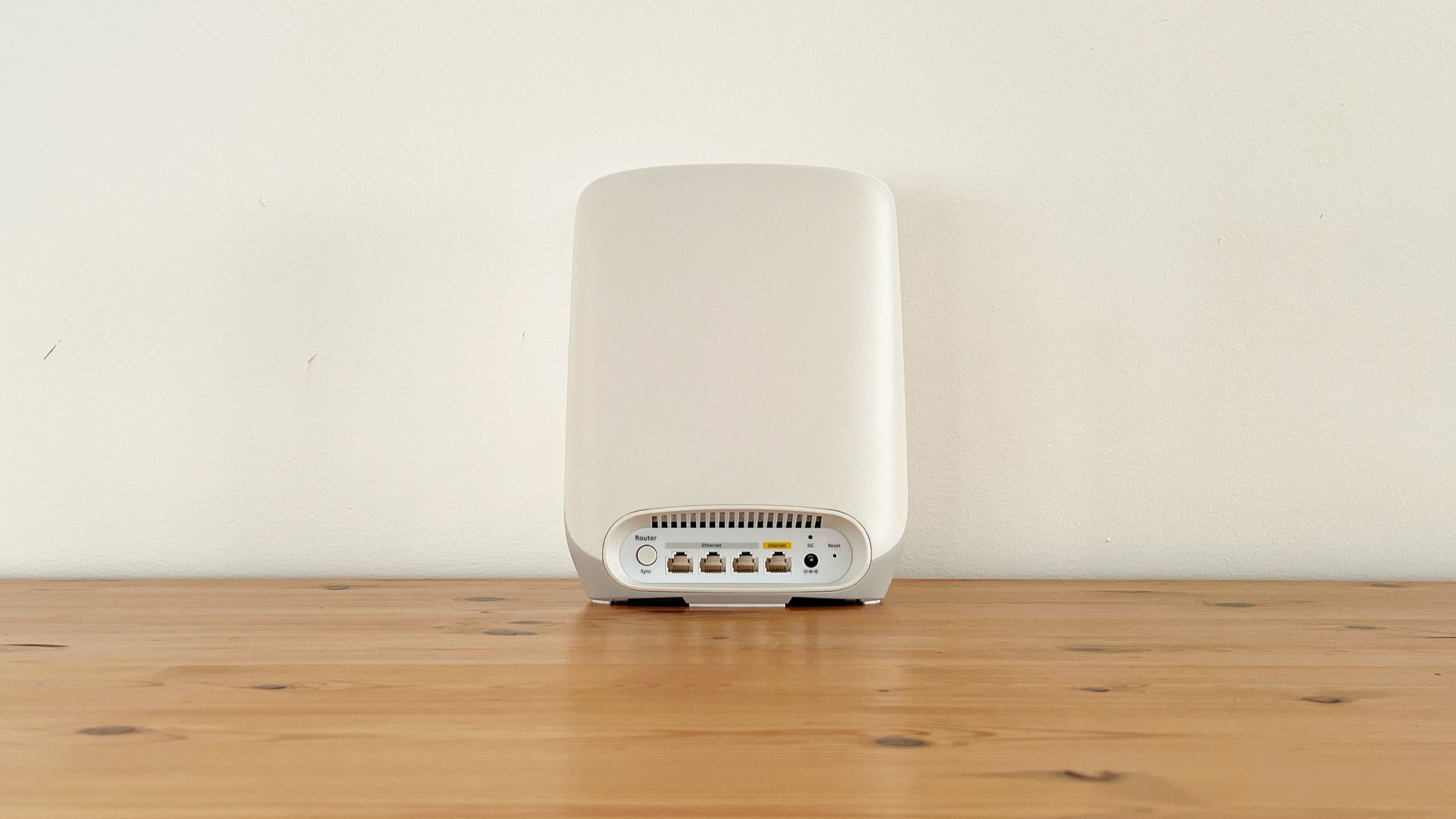
Netgear Orbi RBK763: Two-minute review
Netgear’s Orbi range of mesh Wi-Fi systems has proven very popular in recent years - so much so that there’s now a somewhat confusing array of almost 30 different models currently listed on Netgear’s website.
It even introduced a new model called the RBK960, one of the best mesh Wi-Fi systems on the market, a few months ago that adopted the state-of-the-art Wi-Fi 6E standard, which adds a new 6.0GHz frequency band to the conventional 2.4GHz and 5.0GHz bands used by Wi-Fi 5 and Wi-Fi 6. That high-end technology comes with a high-end price, though, with the RBK960 costing almost $1,500 / £1,500 / AU$2,800.
Thankfully, the new Netgear Orbi RBK763 provides a slightly more affordable alternative that sticks with conventional Wi-Fi 6 while offering tri-band Wi-Fi with a top speed of 5.4Gbps, which should be more than fast enough for most home broadband services and even hardcore gamers. And, like all the Orbi mesh systems, it’s easy to set up and use, making it one of the best Wi-Fi 6 routers for users who aren’t necessarily network savvy.
You do need to think carefully about whether or not you want to sign up for the additional subscription services that Netgear will try to sell you, however.

Most mesh systems consist of two or three identical routers, but the Orbi range has always taken a slightly different approach, with one primary router that is accompanied by one or two ‘satellite’ units. But, at first glance, the router and satellites do look virtually identical, sticking with the same distinctive, upright design used by all the other Orbi models, with the six Wi-Fi antennae tucked inside the body of each unit in order to maintain its smart, slimline design.
The only real difference is that the primary router has four Gigabit Ethernet ports, with one used to connect it to your existing broadband router, while the other three can be used to provide a wired connection for devices such as a laptop or games console. The satellite units simply have two Gigabit Ethernet ports each for wired connections.


Getting started is very straightforward - if a little slow. You can simply connect the primary router to your existing broadband router and then place the two satellites in other areas within your home in order to provide good Wi-Fi coverage throughout the building. It does take the Orbi units a few minutes to warm up when you plug them in, so you have time to go and boil the kettle and rustle up some lunch while you’re waiting. But, once that’s done, you can simply use the Orbi app for iOS and Android to scan a QR code that automatically connects you to your new Orbi network.
The app allows you to stick with the Orbi’s default network name and password, or to change them and provide your own log-in details if you prefer. It then sets up the new network for you, creating a single network that merges the 2.4GHz and 5.0GHz bands - and then promptly proceeds to try and sell you the aforementioned selection of subscription services.
To be fair, you can decide for yourself whether you want the Armor security or ProSupport warranty, but it’s disappointing that this expensive mesh system charges extra for parental controls when there are rival routers and mesh systems that provide good parental controls free of charge.

Ookla Speed Test
Within 5ft, no obstructions: 100Mbps/11Mbps
Within 30ft, three partition walls: 100Mbps/11Mbps
20GB Steam Download
Within 5ft, no obstructions: 12.5MB/s
Within 30ft, three partition walls: 12.5MB/s
Netgear’s hardsell is disappointing, but the Netgear Orbi RBK763 delivers the goods with its strong Wi-Fi performance. As you might expect, devices in the same room as the Orbi router and our normal broadband router simply recorded their usual Wi-Fi speeds of 100Mbps for the Ookla Speed Test, and 12.5MB/s for Steam downloads.
However, we also placed one of the Orbi satellites in a back office that our normal router can’t reach, and where our office computers have to rely on PowerLine adaptors to provide a wired connection instead. The other Orbi satellite was then placed in a hallway, roughly halfway between the primary router and the satellite in the back office. With that set-up in place, we were able to pick up our laptop and wander into the back office, maintaining full speed for Ookla and Steam with no trouble at all.
And, out of curiosity, we also ran those tests without using the second satellite in the hallway. Even with just the main router and one satellite, the Orbi was still able to maintain those speeds consistently, suggesting that the less expensive two-piece RBK762 kit would also be a good option for many small and medium size homes.
Netgear Orbi RBK763: Price & availability
- How much does it cost? $699.99 / £605.38 (three-packed as reviewed)
- When is it available? Available now
- Where can you get it? Available in the US and the UK only
Netgear’s Orbi mesh systems always provide good performance and ease of use, but they don’t come cheap. Prices for the RBK760 series start at $499.99 / £461.51 for a two-piece system (model RBK762) that consists of a primary router and one satellite, and is capable of covering areas of up to 5,000 sq.ft.
However, we reviewed the three-pack option, the Netgear Orbi RBK763, with a router and two satellites, which covers up to 7,000 sq.ft for $699.99 / £605.38. Customers who live in the US can also opt for a four-pack, with a router and three satellites, covering 10,000 sq.ft for $849.99, although that option isn’t currently available in the UK. The Orbi 760 series hasn’t yet reached the Asia-Pacific region, so none of these models is currently available in Australia.
And, as mentioned, Netgear will also do its darndest to sell you additional subscription services too. The price of the RBK763 does at least include a 12-month subscription to Netgear’s Armor security service, but after that first year the service costs an additional $99.99 per year (approx. £82 or AU$160).
You also get a 30-day trial of Netgear’s Smart Parental Control service, after which it costs $7.99 per month (approx. £6.50 or AU$13) or $69.99 per year (approx. £57.50 or AU$112). And, last but not least, there’s the ProSupport extended warranty, which starts at $19.99 (approx. £16.40 or AU$32) for an extra 2-year warranty or $49.99 (approx. £41.00 or AU$80) with 24/7 technical support.
- Value: 3.5 / 5
Netgear Orbi RBK763: Specs
Should you buy the Netgear Orbi RBK763?
Buy it if...
Don't buy it if...
Netgear Orbi RBK763: Also consider
How I tested the Netgear Orbi RBK763
- Used it for 3-4 days
- Used it for my main office Wi-Fi network
- Tested it with the Ookla Speed Test and real-world downloads
I set up the Netgear Orbi RBK763 and used it for my main office Wi-Fi network, full-time for 3-4 days. For general Wi-Fi performance, I used the Ookla Speed Test app in different locations throughout the building. I also tested real-world download speed by downloading large game files from Steam.
We pride ourselves on our independence and our rigorous review-testing process, offering up long-term attention to the products we review and making sure our reviews are updated and maintained - regardless of when a device was released, if you can still buy it, it's on our radar.
First reviewed June 2023





